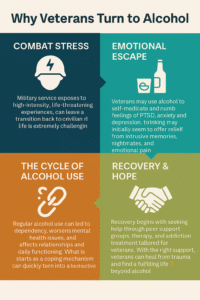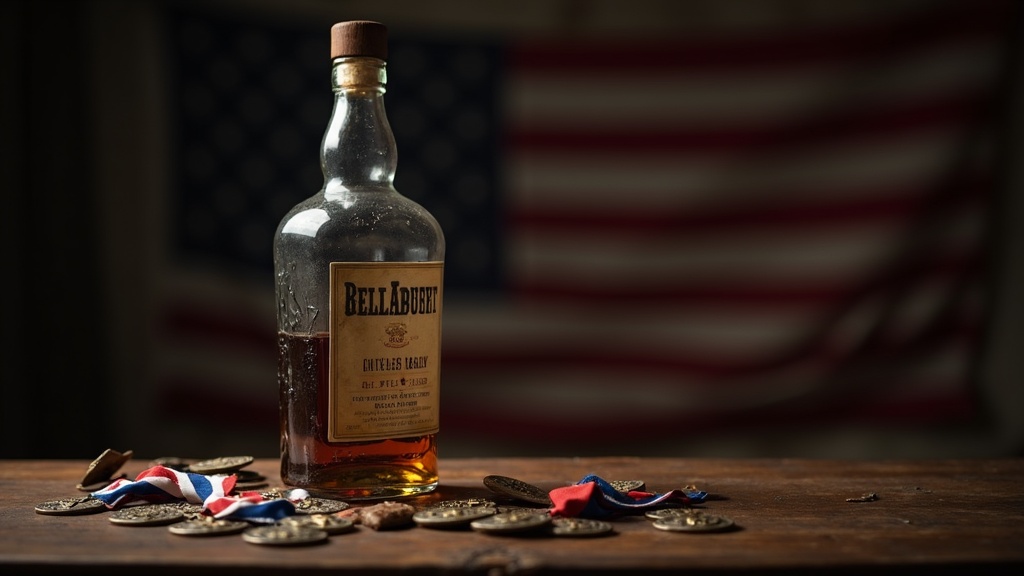Alcohol is more than just a drink for many veterans. It can become a comfort, a distraction, or a way to quiet memories that linger after military service. I’ve seen how reaching for a bottle often feels like the quickest path to relief after returning home from the deployment chaos. For a lot of folks, getting drunk isn’t for fun—it’s about finding a little peace when nothing else helps.
Why Alcohol Appeals to Veterans Leaving the Battlefield
Military life is based on routines, team bonds, and a strong sense of purpose. When veterans return to civilian life, they often lose that structure and support almost overnight. The switch from constantly on alert—where every sound could signal danger—to the quiet of everyday America is tough. This is where alcohol can slip in, offering feelings of familiarity or numbing the complex emotions that refuse to let go.
The anxiety, stress, and guilt that often follow deployment can feel endless. While therapy and counseling provide good help, alcohol is right there, quick and seemingly without judgment. Challenges get even harder with nightmares, trouble sleeping, or flashes from the past that interrupt daily routines. For many, a drink feels like flipping a switch that quiets it all—even if only temporarily.
The History Behind Drinking in Military Culture
Alcohol holds a special place in military settings. From toasts for fallen comrades to relaxing after challenging missions, it’s been part of service for generations. In fact, alcohol used to be given out as part of military rations, showing just how deep the tie runs. These traditions make drinking part of what feels “normal” to many, even long after their last mission.
The culture isn’t just about social drinks, either. The stress, the sense of brotherhood, and the managed chaos of military life make alcohol a group escape. This expectation doesn’t vanish after coming home. Sometimes, it leads to more frequent or heavier drinking that’s hard to step away from, especially during lonely or tough evenings.
Common Challenges Veterans Face After Service
Many veterans carry a load of challenges. Some struggle with posttraumatic stress disorder (PTSD), anxiety, depression, chronic pain, and sleeplessness all at the same time. These aren’t just numbers or diagnoses; they’re real for millions of people who served. When the support system of active duty disappears, it’s easy to wind up feeling isolated and frustrated.
The U.S. Department of Veterans Affairs reports that nearly 20 percent of veterans from recent wars show PTSD symptoms. Still, only a fraction talk about what’s happening or ask for help. Top this with challenges like unemployment, money worries, or relationship troubles, and grabbing a drink becomes the most straightforward solution.
- PTSD: Nightmares, panic attacks, and unshakable anxiety can push anyone to self-medicate.
- Depression: Missing the sense of purpose and camaraderie leaves many feelings hopeless and empty.
- Chronic Pain: Lingering injuries or pain from service make drinking seem like an answer for relief.
- Isolation: Feeling alone or misunderstood pulls veterans toward a bottle for comfort.
Coping Mechanisms: Why Alcohol Becomes a Go-To
I often hear veterans say self-medicating with alcohol isn’t about the buzz. It’s about feeling better, if just for a short while. Alcohol changes brain chemistry, blunting stress and fear. That’s why so many lean on it during hard nights, anniversaries, or even slow afternoons when nothing else brings relief.
Many believe alcohol will help them sleep. At first, it seems like it does, but over time, it disrupts sleep and brings more stress and exhaustion. The short-term relief can lure anyone into a habit that can quickly become a dependence before they realize it.
Drawbacks Veterans May Not Expect
Drinking often creates more trouble than it fixes. Over time, I’ve seen it cause rifts in families, conflicts at work, and health problems. Veterans are sometimes shocked at how a “few drinks to take the edge off” can turn into a tough-to-break cycle.
Recurring issues include:
- Relationship strain: Arguments and growing distance come from drinking more often or too much.
- Health problems: Liver trouble, sleep issues, and a higher risk of depression are common side effects.
- Work difficulties: Showing up late, missing shifts, and trouble focusing can threaten any job.
- Legal troubles: DUIs or related charges stress a tricky adjustment process.
What Helps? Practical Alternatives for Coping
Switching away from alcohol isn’t just about sheer willpower. It needs new habits, firm support, and valuable resources. First, I recommend talking to a trustworthy friend, a veteran’s support group, or a mental health professional. Numerous groups are dedicated to veterans who want to cut back or quit drinking entirely, and knowing others are walking a similar path can make a huge difference.
- Therapy and Support Groups: Regular check-ins with a counselor or peer group supply strategies for stress.
- Exercise and Physical Activities: Gym time, walks, or yoga can lower stress and give back a sense of control.
- Mindfulness and Relaxation: Meditation, breathing exercises, or creative hobbies offer ways to distract from the urge to drink.
- Healthy Routines: Regular sleep, balanced meals, and structured days help rebuild lost stability.
The most important move is to reach out before heavy drinking spirals out of control. Programs like the VA’s SUD-PTSD initiative, VET Centers, and peer groups provide many resources for veterans—most are free or affordable. Check out this VA page for details on specific programs.
Understanding and Supporting Loved Ones
If you’re close to a veteran, simply listening with patience helps more than you may think. Often, just having someone hear their story without judgment gives real relief. Let them know about healthier coping tools—gently and without pressure—and you may open a door to healing.
Learning about groups like the VA, Wounded Warrior Project, and Veterans Crisis Line can help veterans and their families. Books, podcasts, and online support spaces led by veterans can also provide extra comfort and insight. Taking time to check out these resources can help everyone involved better understand what’s happening and how to help.
Frequently Asked Questions
Here are answers to some often-asked questions about veterans and alcohol use:
Why do so many veterans drink more after returning home?
Alcohol often becomes a tool to manage stress, anxiety, PTSD, or a sense of loss when the daily routine and support of military life are suddenly gone.
What are some signs that drinking is becoming a problem?
If alcohol starts interfering with daily life, relationships, work, or health, it’s time to look for more support or guidance from a counselor or support group.
Are there programs specifically for veterans who want to reduce or quit drinking?
Absolutely. Many VA clinics, local organizations, and nonprofits offer confidential, judgment-free spaces for veterans. Support groups, one-on-one counseling, and online resources are widely available—and often free.
Finding a Way Forward
Alcohol is a standard safety net for veterans hoping to quiet pain, memories, or the sudden changes that follow military service. But the most powerful step is to reach out—whether to a friend, family member, or a professional—before drinking causes more challenges. With the proper support, healthier routines, and understanding people in their corner, veterans can manage recovery and adjustment much more easily as they leave the battlefield behind and keep moving forward.
Video: Can Veterans Overcome PTSD without Alcohol?

